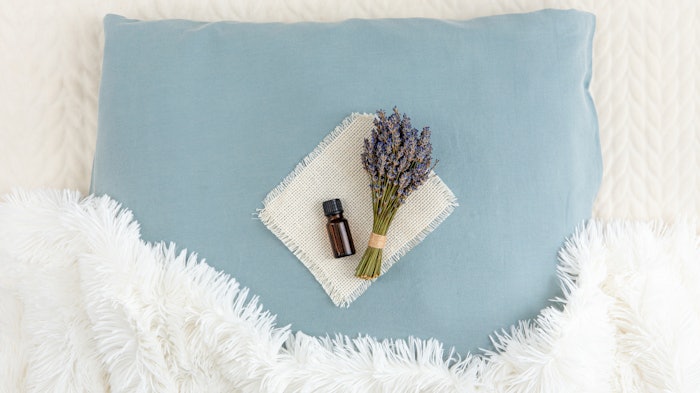
With the fall leaves crisping and crunching beneath our feet and the holidays just on the horizon, our bodies may be adjusting to many changes in the coming months. Everything from shifting temperatures and schedules, to satisfying more festive food cravings and indulging in cozier footwear, these adjustments may require our extra special attention. While the days will be getting shorter, they won’t demand any less of us, which is why we need to dedicate just as much attention to our times of rest.
Maintaining healthy habits around sleep hygiene is particularly important this time of year. Not only are seasonal illnesses like colds and flus more common, but a majority of the population experiences an increase in feelings of stress as we fall into the autumn and winter months. Sleep is a reparative process that helps keep our bodies and minds at their best, allowing us a much-needed break from our routines of daily life. When this important cycle is disturbed, we run the risk of not only depleting our immune system, but also lowering our performance and diminishing our overall sense of well-being.
Recommended
Disturbances from a normal cycle of sleep may be intrinsic (bodily discomforts, stressful thoughts, etc.) or extrinsic (noise, temperature, light, etc.) so simple adjustments to your internal and external environment may make all the difference in giving you the support you need for a better night’s sleep. One thing that combines both of these factors in practice is the art of aromatherapy, as it has the ability to regulate the rhythms of the body and the mind through the modest movement of the breath.
Related: Aromatherapy Treatments for Stress Relief
Aromatherapy Sleep Benefits
When we inhale, the air we breathe can influence multiple systems within our body, including the cardiopulmonary system (the lungs, heart and circulatory systems) and olfactory system (which informs the brain and nervous systems through the sense of smell). This means that even the smallest changes in how (internal) and what (external) we breathe can have a direct effect on how we feel and function.
Breathwork has long been an important wellness tool for stress reduction, pain management and other health challenges, as it can influence the regulation of many bodily processes. During aromatherapy, when we inhale the aromatic compounds of essential oils, these chemical constituents are not only picked up by our sense of smell and interpreted by the brain, but they can also enter the bloodstream to encourage various physiological changes. While many have components that energize the mind and body, there is an abundance of essential oils that help to calm the nerves and relieve muscle tension, which is exactly what we need to help us transition into slumber.
Essential Oils for Sleep
We are all familiar with the relaxation classics lavender and chamomile, and though they are indeed divine, they are not our only options. Depending on your preference, many other plant extracts can aid in helping you get those extra Z’s.
Consider peppermint—while once deemed a stimulant beverage back before there was a coffee shop on every corner, peppermint has cooling and refreshing constituents that may be perfect for those who find themselves overheated, sore or stirred up during the evening hours. If you prefer citrus scents, bergamot is a lovely option. While most citrus oils are thought to be energizing, bergamot has a calming effect on the nerves and blends well with other oils, should you want to experiment.
Other essential oils for promoting rest and relaxation include:
- Sandalwood: rich and seductive
- Cedarwood: warm and woody
- Marjoram: sweet and herbaceous
- Clary Sage: fresh and earthy
Related: 5 Tips for Creating Sleep Wellness Programming
Aromatherapy Application
Using a diffuser for aromatherapy has become a popular and fairly easy way to enjoy essential oils in your space. All it takes is the diffuser and the essential oils or blend of your choice. But there are many additional ways to incorporate aromatherapy into your bedtime routine, and not all of them even require essential oils! Some may prefer a simple spritz of an aromatherapy blend from a bottle; spray it on your linens (especially your pillowcase), clothing (pajamas!) or straight into the air before settling into your sheets.
Topical skin application of aromatherapy oils is another popular choice, with the blend based in a gentle vegetable oil like almond or coconut, and rubbed or rolled onto the wrists, chest or pulse points. A luxurious evening bath can be followed by applying a nourishing body oil mixed with your favorite relaxing aromatherapy blend. If you prefer the gentle scent of dried herbs to pure essential oils, consider placing a sachet in or near your bed, or wear a sleep mask stuffed with herbs like lavender or chamomile.
No matter how you choose to incorporate aromatherapy into your life, the simple intention of setting yourself up for a better night’s sleep with adjustments to your internal and external environment can have a tremendous impact. Not only are you taking the important step of making self-care a priority, you are doing so in a way that supports your most foundational mechanism for life: the breath. Aromatherapy uses breathwork to combine your inner and outer experience into one holistic ritual for well-being, so you can “rest assured” that this seemingly small act can support you through this season’s biggest changes and beyond.











